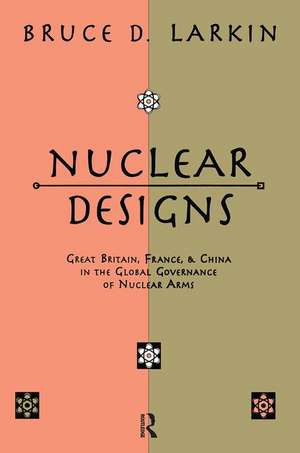Nuclear Designs: Great Britain, France and China in the Global Governance of Nuclear Arms
Autor Bruce Larkinen Limba Engleză Paperback – 5 feb 2018
States now face a global choice among alternative nuclear futures. If they desire to avoid runaway nuclear development, the choices come down to three: the status quo, disengagement, or abolition. Larkin argues that if they chose the status quo, they elect a world in which only terror and self-restraint keep devastation at bay, a world in which instant destruction is possible. This study focuses on the nuclear weapons programs of Great Britain, China, and France, because they may be less familiar to students of international affairs. Each of these countries has developed a substantial nuclear capability that could decisively shape the result of coming global nuclear decisions.
Larkin concludes that these three minipowers could conclude that nuclearism serves their interests, refuse disengagement, and encourage proliferation. If they are prepared to abandon nuclearism, they have tremendous political leverage on Russia, the United States, and also on undeclared and aspiring nuclear weapons states. For now, only the United Kingdom, France, and China maintain sufficient warhead inventories and production capabilities to have strong effects on how the United States and Russia view their own strategic capabilities. Nuclear Choices asserts that governments, polities, and parties today do not know how to guarantee themselves against weapons of mass destruction. They must either acquire the political and social means to achieve such guarantees or accept a world in which nuclearism will continue to cast its shadow over all aspects of nation building. It will be of interest to political scientists, policymakers, military analysts, and those interested hi the nuclear issue.
Preț: 299.52 lei
Preț vechi: 341.55 lei
-12% Nou
Puncte Express: 449
Preț estimativ în valută:
57.31€ • 59.96$ • 47.61£
57.31€ • 59.96$ • 47.61£
Carte tipărită la comandă
Livrare economică 03-17 aprilie
Preluare comenzi: 021 569.72.76
Specificații
ISBN-13: 9781138512665
ISBN-10: 1138512664
Pagini: 376
Dimensiuni: 152 x 229 mm
Greutate: 0.45 kg
Ediția:1
Editura: Taylor & Francis
Colecția Routledge
Locul publicării:Oxford, United Kingdom
ISBN-10: 1138512664
Pagini: 376
Dimensiuni: 152 x 229 mm
Greutate: 0.45 kg
Ediția:1
Editura: Taylor & Francis
Colecția Routledge
Locul publicării:Oxford, United Kingdom
Cuprins
Appendices, Figures and List of Tables, Introduction, 1. Nuclear Choices, 2. Nuclear Programs, 3. Test Ban and Non-Proliferation Regimes, 4. Reducing Inventories, 5. Coordinations, 6. Verification and Transparency, 7. National Structures and Civil Society, 8. Costs and Risks, 9. Threats and Fears, 10. Conclusions, Glossary, Bibliography, Index
Descriere
Global politics has changed with unaccustomed swiftness since the end of the Cold War
